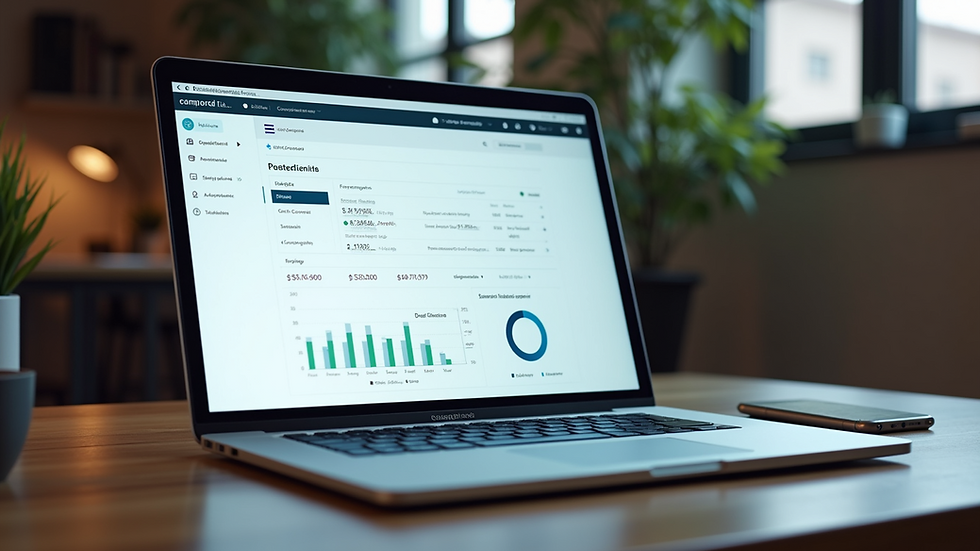What to Look for When Building an E-commerce Platform
- Brandon Fish
- Aug 13, 2025
- 4 min read
Building an ecommerce platform is a critical step for any business aiming to expand its online presence and boost sales. Choosing the right features and tools can make the difference between a thriving online store and one that struggles to attract customers. This guide will walk you through the essential factors to consider when developing your ecommerce platform, helping you make informed decisions that align with your business goals.
Key Features to Consider in Ecommerce Development
When planning your ecommerce development, focus on features that enhance user experience, streamline operations, and support growth. Here are some must-have elements:
User-Friendly Design: Your platform should be easy to navigate. Clear menus, search functionality, and a responsive design that works well on mobile devices are essential.
Secure Payment Options: Offer multiple payment methods such as credit cards, PayPal, and digital wallets. Ensure your platform complies with security standards like PCI DSS.
Inventory Management: Real-time tracking of stock levels helps prevent overselling and keeps customers informed.
SEO Optimization: Built-in SEO tools help your products rank higher in search engines, driving organic traffic.
Scalability: Choose a platform that can grow with your business, handling increased traffic and product listings without performance issues.
Customer Support Integration: Live chat, chatbots, or easy access to customer service improve trust and satisfaction.
By prioritizing these features, you create a solid foundation for your online store that attracts and retains customers.

Understanding Ecommerce Development: What You Need to Know
Ecommerce development involves creating a website or app that allows businesses to sell products or services online. It combines web design, programming, and marketing strategies to build a platform that is both functional and appealing.
There are two main approaches:
Custom Development: Building a platform from scratch tailored to your specific needs. This offers maximum flexibility but requires more time and investment.
Using Ecommerce Platforms: Solutions like Shopify, WooCommerce, or Magento provide ready-made tools and templates. They are quicker to launch and often more cost-effective.
When deciding, consider your budget, timeline, and technical expertise. Custom development is ideal for unique business models, while platforms are great for standard online stores.
Additionally, integrating your ecommerce site with other business systems like CRM, ERP, and marketing tools can streamline operations and improve customer insights.

What Does an Ecommerce Developer Do?
An ecommerce developer plays a crucial role in bringing your online store to life. Their responsibilities include:
Designing and Building the Website: Creating the front-end (what users see) and back-end (server, database) components.
Implementing Payment Gateways: Ensuring secure and smooth transaction processing.
Optimizing Performance: Making sure the site loads quickly and handles traffic spikes.
Integrating Third-Party Services: Adding tools for marketing, analytics, shipping, and customer support.
Maintaining Security: Protecting customer data and preventing cyber threats.
Testing and Debugging: Identifying and fixing issues before and after launch.
Hiring a skilled ecommerce developer or team ensures your platform is reliable, scalable, and user-friendly, which is vital for long-term success.
Choosing the Right Ecommerce Platform Development Partner
Selecting the right partner for your ecommerce platform development can significantly impact your project's outcome. Here are some tips to help you choose:
Experience and Portfolio: Look for developers or agencies with proven experience in ecommerce projects similar to yours.
Technical Expertise: Ensure they are proficient in the technologies and platforms you want to use.
Communication: Clear and regular communication is essential for understanding your needs and providing updates.
Support and Maintenance: Post-launch support is crucial for handling updates, security patches, and troubleshooting.
Cost Transparency: Understand the pricing structure and avoid hidden fees.
A reliable partner will guide you through the process, from planning to launch, and beyond, helping you achieve your business goals efficiently.
For professional assistance, consider exploring ecommerce platform development services that specialize in creating tailored online stores.

Enhancing Your Ecommerce Platform for Growth
Once your ecommerce platform is live, focus on continuous improvement to stay competitive:
Analyze User Behavior: Use analytics tools to understand how visitors interact with your site and identify areas for improvement.
Optimize for Mobile: With increasing mobile shopping, ensure your platform offers a seamless mobile experience.
Implement Marketing Strategies: Leverage SEO, email marketing, social media, and paid ads to drive traffic.
Personalize Customer Experience: Use data to offer personalized recommendations and promotions.
Expand Payment and Shipping Options: Cater to diverse customer preferences to reduce cart abandonment.
Regularly Update Content: Keep product descriptions, images, and blog posts fresh and relevant.
By actively managing and enhancing your ecommerce platform, you can increase customer satisfaction and boost sales over time.
Final Thoughts on Building Your Ecommerce Platform
Building an ecommerce platform is a significant investment that requires careful planning and execution. Focus on creating a user-friendly, secure, and scalable site that meets your customers' needs. Partner with experienced developers and continuously optimize your platform to adapt to changing market trends.
Taking these steps will help you establish a strong online presence and grow your business successfully in the digital marketplace.


